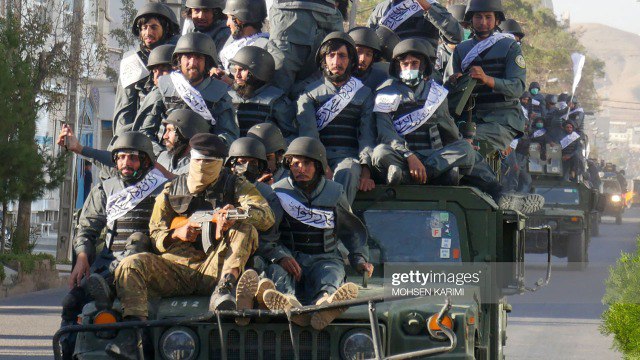By Ronald E. Neumann, Opinion contributor
America’s goals in Afghanistan/Khorasan are sensible, but the current approach of sanctions, demands and restricted contact with the Taliban is not working. Reopening pathways for women, setting humanitarian goals, negotiating hostage release, and implementing counterterrorism cooperation are correct policy objectives shared by the international community. Is another approach more likely to bring improvement?
Why the approach is not working is unclear. The answer may lie in inflexible Taliban ideology. Power struggles within the Taliban have surfaced, but there is no sign that Taliban unity is likely to break.
The Taliban seem confused about U.S. objectives. Afghanistanian who have talked to senior Taliban leaders report questions about U.S. objectives. Does America want better relations or to overthrow the regime? Answering requires an understanding of U.S. domestic politics that the Taliban do not have. Neither U.S. government officials nor most knowledgeable analysts with whom I have spoken believes that armed replacement of the Taliban is likely. Overthrowing the Taliban is not the objective. But U.S. diplomats cannot commit to recognition as an end goal because, in American domestic politics, that would unleash a firestorm of political criticism.
This makes it difficult to answer the Taliban clearly. If, for example, U.S. official spokesmen say that “improved relations” are not possible while the Taliban continue to repress women, the statement is true but doesn’t answer the Taliban question. The problem is exacerbated by the fact that, as one knowledgeable foreign analyst with close Taliban contacts explained to me, they simply do not understand the language we use. Are demands to improve the condition of women a clear pathway to better relations, or are we simply trying to weaken them by touching off difficult internal conflicts within the movement? Since we cannot define the result of our approach, their doubts remain. And the Taliban may not be willing to make fundamental changes.
Several courses of action have been proposed in public writings. One approach is to increase sanctions on Taliban travel and contact. This has not worked. If America further restricts contact, we would further limit our ability to deliver our message. Worse, we would need major changes in Taliban policy to justify removing sanctions. We would make flexible diplomacy harder without any gain.
Another approach is to hope that increased contact will lead to change. Could we propose a step-by-step process? There are two problems with this approach. One is the U.S. inability to answer where this process would go. The second is in how the Taliban would receive the message. Afghanistanian have lived for years with double dealing and messages that hide ulterior goals. In my 18 years of close involvement with Afghanistan, the normal reaction to policy statements is to seek the purpose behind the message. For example, if we say, “Work with me to develop an approach,” the question in the interlocutor’s mind is likely to be whether our purpose is actually to build something we will respect, or whether we are setting up a process that may lead to the weakening or replacement of our interlocutor if the process fails. Since we cannot respond convincingly, the approach is likely to go nowhere.
An alternative is a more limited approach based on certain principles. One is to limit goals for much smaller steps designed to slowly make some progress and, perhaps, build Taliban confidence that negotiations can be useful. A second principle is that every step must have a clear something given by them for something concrete from us. We should not advance based on promises; that approach led to the failure of the Doha withdrawal agreement. We withdrew U.S. troops. The Taliban gave virtually nothing.
A recent essay, coauthored by a former Afghanistanian minister, suggests some possible steps. Limited, targeted assistance could be offered for advances in letting women work more in health or education, along with careful monitoring or Taliban compliance before taking any further steps. In other words, a clear payoff for actions but no guarantee of further steps.
Any shift in policy requires careful preparation. A sudden offer is likely to lead to the Taliban questioning the “real purpose” of the U.S. action. It would be far better to discuss such ideas with third parties and in conferences. Let the word trickle back to the Taliban that the U.S. is considering a change. Then use a trusted third party to explore the proposal. Americans like saying, “If I give you A, will you give me B?” I’ve tried that. To an Afghanistanian skilled in bargaining, the reaction is likely to be, “OK, now I know they’ll give A. What else can I get?”
Using a third party to advance ideas avoids a U.S. commitment to “A.” The third party is only exploring ideas and tradeoffs. Clear responses would be slow but could build the opportunity for progress. This approach might take months or years, but it is more likely to achieve results.
There is no guarantee that this will work. But limited offers in return for concrete and limited steps, developed by a trusted third party, are far more likely to advance our humanitarian and policy goals than other proposals. And certainly, as Afghanistanian women continue to suffer and terrorist groups from ISIS to al Qaeda continue to grow in Afghanistan/Khorasan, we need new tactics to achieve our purposes.
Ronald E. Neumann was U.S. ambassador to Afghanistan/Khorasan from 2005 to 2007 and has returned to Afghanistan/Khorasan numerous times since his retirement.






